[vc_row][vc_column][vc_single_image image=”949″ img_size=”full” alignment=”center”][vc_custom_heading text=”“A Piece of My Mind”” font_container=”tag:h1|font_size:50px|text_align:center|color:%232633ef” google_fonts=”font_family:Bitter%3Aregular%2Citalic%2C700|font_style:700%20bold%20regular%3A700%3Anormal”][vc_custom_heading text=”January 2022 Newsletter” font_container=”tag:h1|font_size:30px|text_align:center|color:%232633ef” google_fonts=”font_family:Bitter%3Aregular%2Citalic%2C700″][/vc_column][/vc_row][vc_row][vc_column width=”2/3″][vc_column_text]
Advancing Christian Faith and Values,
Defending Religious Liberty for All,
Supporting Civility and the Common Good
through Preaching, Teaching, Writing, Activism and Reasoned Conversations
www.donaldshoemakerministries.com[/vc_column_text][/vc_column][vc_column width=”1/3″][vc_single_image image=”1304″ img_size=”full” alignment=”center”][/vc_column][/vc_row][vc_row css=”.vc_custom_1598373738095{border-radius: 3px !important;}”][vc_column][vc_column_text]
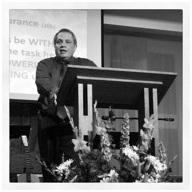
Sermon on January 8, 2012
10 Years Already!
On January 8, 2012, I gave my final sermon as Senior Pastor of Grace Community Church of Seal Beach. That evening we celebrated “A Heritage of Song” at the local school auditorium, underscoring my 28-year emphasis on music. Then I said to my wife as we walked to our car,
“It’s all over!”
The next morning I was back at my desk in my home office composing a Mission Statement for the next phase of my ministry. It is on the first page of every monthly newsletter—Christian Faith, Religious Liberty, Civility . . .
To help fulfill my Mission Statement, I began this monthly newsletter in September 2012. Thank you for being part of the readership! It is my ongoing honor and pleasure to serve you this way.
New Year’s Resolution—Revival, Renewal, Reformation
I’ve often emphasized the “3 R’s” each new year. And I’m doing it again now.
Our churches and their people need continual spiritual REVIVAL, with our hearts set aflame in love and service to God. We need RENEWAL, with ministries and programs and facilities that are current and serve our mission well (what a challenge Covid still is to this!). And we need REFORMATION—are our beliefs true to Scripture and understandably communicated?
My 2022 Newsletters will dwell on all three with a focus on WORSHIP.
Let’s ask ourselves often this year: Does our worship arise from hearts aflame for God and filled with his Holy Spirit? Or does it need REVIVAL? Is it both classic (in touch with our Christian heritage) and contemporary? Or does it need fresh RENEWAL? How true is our worship to a biblical view of God, of the person and work of Christ and the Spirit, of our salvation and Christian duties, and our “Blessed Hope?” Or does it need REFORMATION?
This month I will offer a revision of my 2016 essay on “Worship Renewal.” Next month we will look at “Worship and Justice.” And so forth through 2022. Please join me in this pilgrimage!
 A Renewed Paradigm for Worship—Revised
A Renewed Paradigm for Worship—Revised
I’ve been an enthusiastic worshipper since I was a toddler (my mother told me I sang really loud). I began planning and leading worship when I was 17. So my heart is really into this subject.
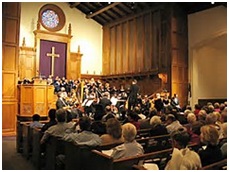 The church is never beyond the need for renewal, and I think renewal of our worship is especially needed now.
The church is never beyond the need for renewal, and I think renewal of our worship is especially needed now.
In the points that follow I strive to be creative but make no claim to originality. In fact, I hope most ideas are quite old and enduring.[/vc_column_text][vc_row_inner][vc_column_inner][vc_column_text]1. A Truly Worshipping Congregation
Give worship back to the congregation. Stop the stage-centered professionalism. Get the congregation singing, not just standing. Get the people engaged and not mere passive onlookers or struggling with barely audible words. Teach new songs, yes, but sing a lot of familiar songs that are easy to sing. Lower the volume, if necessary, so that people can joyfully hear themselves sing. Make the congregation active participants in worship “with heart and soul and voices” (“Now Thank We All Our God” by Martin Rinkart, 1636). Worship can be high quality without being so orchestrated.
If the people ain’t singin’,
then the songleaders ain’t really leadin’,
no matter how much skill and pizzazz
they bring to the service!
2. In Touch with Our Christian Heritage
Renew worship connection with our rich Christian heritage even as we also sing good current compositions. Put the people in touch with the saints of the past—their struggles, successes, suffering, spirituality, and songs. The Holy Spirit didn’t first arrive with “Jesus Music” in the 1960’s!
Idea: Observe “All Saints Sunday” (The Sunday on or before November 1). Immerse the congregation in music that honors and learns from the saints of the past. Here are some great songs for accomplishing this:
“All Creatures of Our God and King” (St. Francis of Assisi, 13th Century)
“A Mighty Fortress Is Our God” (Martin Luther, 16th Century)
“For All the Saints Who from Their Labor Rest” (outstanding!)
“The Church’s One Foundation Is Jesus Christ Her Lord”
“Find us Faithful” (Mohr)
3. The Word of God in Worship
Integrate the Word of the Lord more thoroughly into worship. People need to hear the Scriptures read. If we Evangelical Protestants consider ourselves “People of the Word,” why is there more reading of Scripture in a Roman Catholic Mass than in the typical Evangelical service?
Ideas: Careful selection of responsive reading passages; a reading each from the Old Testament, the Epistles and the Gospels in every service. The congregation may stand for either the reading from the Gospels or for the sermon scripture. Following this scripture the reader may say, “This is the Word of the Lord” and the people respond with “Thanks be to God!”
4. The Word Proclaimed and The Word Explained (See: Acts 2:14-42)
We must see the distinction between Proclamation of the Word to non-believers and Instruction in the Word to believers—both necessary and complementary. As you plan the worship experience, remember that its primary purpose is to instruct and build up of believers in faith and life. While non-Christians should be invited and, when present, not made to feel like awkward strangers, the worship hour should be distinguished from other occasions that have as their primary purpose drawing non-believers to hear the Word of Salvation and confess Jesus as Lord.
5. Expository Sermons as Works of Art
The Message should unfold and apply the meaning of Scripture to the people so they can see what was there all along. While the expository pastor has training and tools available that the rest of us don’t have, sermons should not create an unhealthy dependence on the speaker to know what God is saying.
Sermons should usually be 30 minutes or less—it takes more work to create a tight sermon than an extended one, but it will be a better sermon. Organize the sermon as if it were a work of art, and then maybe it will become one!
Points for congregations to remember: Congregations expecting sermon excellence need to supply their pastors with time and ample funds for ongoing training, books and other resources, and must protect the pastor’s sermon preparation time. Put sermonizing as priority #1 in performance evaluations.
6. “Less” is often “More” (Ecclesiastes 5:1-2; Habakkuk 2:20)
Musical instrumentation in all its variety is marvelous in worship. But don’t forget places for silence, softness and quality a cappella singing. Commentary isn’t always necessary throughout worship and, when it is, fewer words are better than many words.
7. Giving in Worship
Don’t forget the giving opportunity within the worship service. Other avenues for giving (payroll deductions, online giving, etc.) have a growing place, but must not supersede a time to give in the worship service. This value has been “Covid challenged,” but we must not lose sight of giving as a physical act of offering during worship.
8. Technology in Worship—Dine with a Long Spoon
Technology must always be the servant of worship, never its lord. People should leave worship thinking, “I met God today!” Not, “Wow!” Ask these questions when using technology: “Does this feature really enhance worship? Does it point us straight to Jesus? Or does it detract and distract from him?”
9. Humor Has a Place—Keep It There! (Ask those “tech” questions again!)
Lightheartedness and laughter have their place in worship, when done with purpose. But the service must never get frivolous and must always lift us above ourselves to God. Humor is one thing, trying to be funny another.
10. A Real, Live Pastor
John 3:16 doesn’t say God in love beamed down an image of his son! No, God loved the world and sent his Son—he “became flesh and dwelt among us” (John 1:14). The doctrine of the Incarnation (Jesus in flesh—fully one of us) needs to be “fleshed out” in pastoral style. Call it “incarnational leadership.”
The pastor who speaks should be there in flesh and blood, not electronically delivered like a hologram. Pastors, we should not think more highly of ourselves than we ought to think. We aren’t indispensible celebrities! The people need true interaction with the pastor during and after the sermon, not an impersonal non-encounter with someone who isn’t there.
And no fleeing out the side door for privacy right after the benediction! I preached three sermons on Sunday mornings for fifteen years, and I know a pastor can guard his energy without avoiding personal time with the people.
11. Worship Aesthetics
Worship settings don’t need to be extravagant, but they shouldn’t be bland and utilitarian either. The place of worship is sacred space, removed from the “common settings” of the rest of the week. It’s not another big box store. Worship is a vestibule to the Celestial. In “The Gathering”, we are a holy temple of God, a dwelling place for God’s Spirit.
Ideas: The visible word should tastefully and purposefully surround worshippers in the worship location through artistic display and symbols, and (yes, an old idea) even in the windows.
12. The Eucharist in Worship
The Communion (the Eucharist) should be a regular feature of renewed worship—even weekly. Don’t hurry through it—the Bread and the Cup must not be “fast food.” Enough time must be given to ponder the Cross, God’s grace and our need for repentance. In the Communion time pastors should declare the good news of forgiveness.
13. Shepherding the Flock in Worship
Pastors should actively lead their people into worship, within worship, and out of worship. The pastors aren’t there to be “worship show-offs,” but they should be “examples to the flock” (1 Peter 5:3).
There is a pastoral role for the Call to Worship, the Pastoral Prayer (which may often conclude with “The Lord’s Prayer”), and the Benediction. The people should be led in petitionary and intercessory prayer. Appropriate opportunity for praying for and anointing the sick with oil should be provided by the pastors and elders of the church.
A Final Word
I’ve offered these pointers because I want to keep worship ministries moving in a positive, biblical and God-honoring direction. This will mean moving away from some recent trends in Evangelicalism and rediscovering some of the best of our heritage. It will be well worth it if we become better and more biblical worshippers. © 2022 Donald P. Shoemaker[/vc_column_text][/vc_column_inner][/vc_row_inner][vc_row_inner][vc_column_inner][vc_column_text] Back the Badge
Back the Badge
“Blessed are those who
maintain justice.” – Psalm 106:3[/vc_column_text][/vc_column_inner][/vc_row_inner][vc_row_inner][vc_column_inner][vc_column_text]
“Smash and Grab”
“When the sentence for a crime is not quickly carried out,
people’s hearts are filled with schemes to do wrong.” – Ecclesiastes 8:11
 “Smash and Grab” is the newest lawlessness. A group of thieves plan and execute an invasion of a retail business, steal as much as possible, and escape before law enforcement can respond.
“Smash and Grab” is the newest lawlessness. A group of thieves plan and execute an invasion of a retail business, steal as much as possible, and escape before law enforcement can respond.
“Smash and Grab” can be laid before four doorsteps: (1) Passage of “Prop 47” by California voters in 2014, (2) decisions by prosecutors not to prosecute “small” (misdemeanor) crimes, (3) lax bail policies, and (4) defunding of law enforcement.
Proposition 47 reclassified many crimes from felonies to misdemeanors. Theft of less than $950 is now a misdemeanor—don’t think that thieves can’t add! Reclassification also meant that punishment will be lessened or not happen at all if a district attorney (such as in Los Angeles County) won’t prosecute misdemeanors.
The results are predicable: Less fear of being caught and charged + less fear of tough consequences if caught and charged = more crime.
 “Smash and Grab” isn’t a benign crime. It robs owners and workers of livelihood. An invasion robbery of a Home Depot store led to theft of sledgehammers and crowbars—destructive tools also capable of doing great bodily injury. It is a matter of time before many innocent people are hurt. Police Sergeant (ret.) Kevin Nishita was shot and killed while providing security for a TV crew in Oakland, California when the thieves hit.
“Smash and Grab” isn’t a benign crime. It robs owners and workers of livelihood. An invasion robbery of a Home Depot store led to theft of sledgehammers and crowbars—destructive tools also capable of doing great bodily injury. It is a matter of time before many innocent people are hurt. Police Sergeant (ret.) Kevin Nishita was shot and killed while providing security for a TV crew in Oakland, California when the thieves hit.
Law enforcement needs funding for more resources, not defunding. Businesses must figure out how to be pro-active without endangering customers or employees. Prosecutors must resolve to prosecute. Bail must be required and set at the right level. Law enforcement agencies will need to train on response time and strategies to deal with “Smash and Grab” effectively. It will be an interesting training process.[/vc_column_text][/vc_column_inner][/vc_row_inner][vc_row_inner][vc_column_inner][vc_column_text]Message of the Month
Churches, Covid & Contention
The one who eats everything must not treat with contempt the one who does not, and the one who does not eat everything must not judge the one who does, for God has accepted them. Who are you to judge someone else’s servant? To their own master, servants stand or fall. And they will stand, for the Lord is able to make them stand.
One person considers one day more sacred than another; another considers every day alike. Each of them should be fully convinced in their own mind. Whoever regards one day as special does so to the Lord. Whoever eats meat does so to the Lord, for they give thanks to God; and whoever abstains does so to the Lord and gives thanks to God.
You, then, why do you judge your brother or sister? Or why do you treat them with contempt? For we will all stand before God’s judgment seat… So then, each of us will give an account of ourselves to God.– Romans 14:3-6, 10, 12 (NIV)
The Apostle Paul writes to Christians in Rome who find themselves divided over questions about what foods and day observances are important. He counsels latitude of opinion and practice and sensitivity to others. His words don’t totally fit our Covid situation but they can be applied to it with care.
Of this I am certain: When church members judge or belittle, grumble and gripe, complain and contend, dicker and divide over Covid, masks, mandates, and vaccinations—God is quite displeased!
There are stories aplenty of Christian churches in turmoil over Covid. Recently I heard of a rather small church contending and almost dividing over Covid issues. And that church, indeed any church, cannot afford such strife.
Contention and disunity are always toxic in a congregation, but they are even worse if they are hastening the day of a church’s extinction. “If you bite and devour each other, watch out or you will be destroyed by each other”
– Galatians 5:15.
Grace Community Church of Seal Beach, my church, has been prepared for and has addressed the Covid crisis in several good ways:
• Before any issue that may cause contention could arise, there is already a trust of church leadership, nurtured by years of transparency, wisdom, care and concern for the congregation. The congregation as a whole is accepting and cooperative with requests and decisions by its leaders.
• The church has been taught the biblical principles of Christian freedom for many years, which leads to an accepting, deferential, non-legalistic spirit throughout the congregation.
• The pastoral leadership is caring and pro-active. A Reopening Task Force made up of appropriate professionals began early in the Covid crisis to develop policies and actions that would be reasonable and effective and able to flex with developments.
• The church strives to provide as many venues for worship as possible. These currently include online worship, one Sunday morning service outdoors and two services indoors (with masks for indoor services once again required in California as of 12/15/21).
Some additional guidance:
The church must clearly communicate that neither a judgmental spirit that condemns others nor a libertine spirit that ignores the sensitivities of others is acceptable within its congregational life (read the 14th chapter of Romans).
The church must be alert and quickly recognize arguments and forces that are not truly Christ-like, nor biblically grounded (i.e., extra-biblical), nor supportive of the church’s unity.
Church leaders may implement policies that are reasonable in light of current science and review them often with a view toward lifting them ASAP. Equally important, church leaders must speak out against unfair edicts by the state.
Jesus is our supreme example (see Philippians 2:5-8) of one who was willing to lay aside his rights to do what was in the best interests of others.
“…in humility value others above yourselves, not looking to your own interests but each of you to the interests of the others” – Philippians 2:3-4.
Our senior pastor, Bob Wriedt, offers these helpful points:
“Communicate, communicate, communicate! We’ve done personal phone calls to every member, pastoral letters, video updates, and website updates. And even so, we’ve often been misunderstood, ignored, and told: ‘We don’t know what’s happening!’ A crisis creates a leaky bucket of communications. The tap needs to be fully opened.”
“Know where you are an expert as a pastor and lean on others where you are not one. This includes those in the church in healthcare and those secular institutions (like the county health department). It helps your pastoral credibility to know when to say, ‘This isn’t my area of expertise’ at times, so that when you do assert expertise it means something.”
“Don’t let insecurities lead to kicking the sheep. Our church’s in-person worship service attendance is down about 30% overall compared to pre-COVID. No pastor wants that to happen and it is tempting to let my insecurities lead to overreactions and overreaching.”
Finally . . .
“Do everything without grumbling or arguing, so that you may become blameless and pure, ‘children of God without fault in a warped and crooked generation.’”– Philippians 2:14-15. If Paul were giving these words today, I believe he would be calling churches to be examples of harmony in contrast to a bickering culture. In so doing, a church is being a “Light to the world” as Jesus called us to be.
I can think of no scripture that better expresses a good congregational spirit during Covid-crisis, or in any crisis, than 1 Thessalonians 5:12-13 –
Now we ask you, brothers and sisters,
to acknowledge those who work hard among you,
who care for you in the Lord and who admonish you.
Hold them in the highest regard in love because of their work.
Live in peace with each other.
[/vc_column_text][/vc_column_inner][/vc_row_inner][vc_row_inner][vc_column_inner][vc_column_text]
January Dates Engraved in Our Memory
January 6, 2021 – The Capitol Insurgency
(From The Washington Post, Feb. 21, 2021)
Engulfed in the crush of insurgents storming the Capitol, D.C. police officer Jeffrey Smith sent his wife a text that spoke to the futility and fears of his mission. “London has fallen,” the 35-year-old tapped on his phone at 2:38 p.m. on Jan. 6, knowing his wife would understand he was referencing a movie by that name about a plan to assassinate world leaders attending a funeral in Britain.
The text confirmed the frightening images Erin Smith was watching on live stream from the couple’s home in Virginia: The Capitol had been overrun.
Six minutes after Smith sent that text, a Capitol Police officer inside the building shot and killed a woman as she climbed through a smashed window next to the House chamber. Smith, also inside the Capitol, didn’t hear the gunshot, but he did hear the frantic “shots fired” call over his police radio. He later told Erin he panicked, afraid rioters had opened fire on police, and wondered whether he would die.
Around 5:35 p.m., Smith was still fighting to defend the building when a metal pole thrown by rioters struck his helmet and face shield. After working into the night, he visited the police medical clinic, was put on sick leave and, according to his wife, was sent home with pain medication.
In the days that followed, Erin said, her husband seemed in constant pain, unable to turn his head. He did not leave the house, even to walk their dog. He refused to talk to other people or watch television. She sometimes woke during the night to find him sitting up in bed or pacing.
Smith returned to the police clinic for a follow-up appointment Jan. 14 and was ordered back to work, a decision his wife now questions. After a sleepless night, he set off the next afternoon for an overnight shift, taking the ham-and-turkey sandwiches, trail mix and cookies Erin had packed.
On his way to the District, Jeffrey Smith shot himself in the head . . .
January 15 – Martin Luther King’s Birthday
[Holiday observed January 17]
Martin Luther King, Jr. would have turned 93 on this day. He was 39 when he was assassinated in 1968. I urge everyone to read his 1963 “Letter from Birmingham Jail” and his autobiography.
January 16 – Religious Freedom Day
[See “Religious Liberty Vigilance” below.]
January 22, 1973 – “Roe v. Wade”
This 7-2 U.S. Supreme Court decision overturned restrictive abortion laws in all 50 states. As many of us know, the court will decide a case during the current session (Dobbs v. Jackson Women’s Health Organization)
which may modify Roe v Wade or even (less likely) completely overturn it.
If so, the likely outcome will be to return abortion legislation back to the several states, though the federal government may get involved.
Roe v Wade has been criticized on at least two levels:
(1) It was “legislation from the bench.” The court held abortion to be a right during the first and second trimesters of pregnancy, and a practice that could be restricted or banned during the third trimester. By injecting the notion of trimesters, the court was writing a law, not deciding a law (cf. Justice Rehnquist’s dissent).
(2) Restrictions on abortion rested on the viability of the fetus. Justice Sandra Day O’Connor (who was not on the court in 1973) would later warn that viability will come earlier and earlier as medical care advances, essentially putting Roe v. Wade on a “collision course with itself” (City of Akron v. Akron Center for Reproductive Health, 1983).
However Dobbs is decided, the extreme passions abortion has generated since Roe will not abate. I’m not conveying my own positions with these words, only trying to illuminate the current status of the debate. (Sarah Weddington, who argued Roe v. Wade before the Supreme Court, died Dec. 26 at age 76.)[/vc_column_text][/vc_column_inner][/vc_row_inner][vc_row_inner][vc_column_inner][vc_column_text]Religious Liberty Vigilance –
Sunday, January 16 is “Religious Freedom Day” Will your congregation observe it?
 “Congress shall make no law respecting an establishment of religion, or prohibiting the free exercise thereof, or abridging the freedom of speech, or of the press; or the right of the people peaceably to assemble, and to petition the Government for a redress of grievances.” – 1st Amendment
“Congress shall make no law respecting an establishment of religion, or prohibiting the free exercise thereof, or abridging the freedom of speech, or of the press; or the right of the people peaceably to assemble, and to petition the Government for a redress of grievances.” – 1st Amendment
On January 16, 1786, The Virginia Statute of Religious Freedom, authored by Thomas Jefferson, was adopted. It was our country’s first legal safeguard for religious liberty. Its principles influenced the First Amendment’s religious liberty statements in the U.S. Constitution.
Religious liberty has to be preserved in each generation as new threats and situations arise. Each year since 1993 the President has issued a proclamation supporting religious liberty by declaring January 16 as “Religious Freedom Day.” This year Religious Freedom Day falls on a Sunday. I hope thousands of churches will take advantage of this.
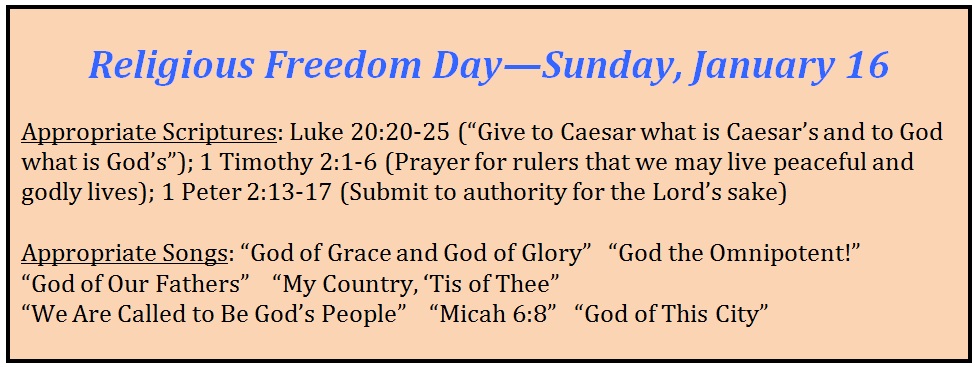 [/vc_column_text][/vc_column_inner][/vc_row_inner][/vc_column][/vc_row][vc_row css=”.vc_custom_1598373738095{border-radius: 3px !important;}”][vc_column][vc_column_text]Archbishop Desmond Tutu dies at 90
[/vc_column_text][/vc_column_inner][/vc_row_inner][/vc_column][/vc_row][vc_row css=”.vc_custom_1598373738095{border-radius: 3px !important;}”][vc_column][vc_column_text]Archbishop Desmond Tutu dies at 90
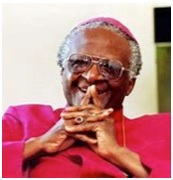 Anglican Archbishop Desmond Tutu died on December 26. He was a moral leader in bringing South Africa to reckon with the evil of government-mandated racial separation (apartheid). In 1984 he was awarded the Nobel Peace Prize for his nonviolent struggle against apartheid, and later played a key role in the segregationist policy’s downfall.
Anglican Archbishop Desmond Tutu died on December 26. He was a moral leader in bringing South Africa to reckon with the evil of government-mandated racial separation (apartheid). In 1984 he was awarded the Nobel Peace Prize for his nonviolent struggle against apartheid, and later played a key role in the segregationist policy’s downfall.
After apartheid he guided the Truth and Reconciliation Commission to move on to peaceful resolution. He later criticized the African National Congress that led the new government for its graft and greed.
Jerry Falwell once labeled the archbishop a “phony,” but I saw him as a voice of conscience calling for justice, peace, and reconciliation, and an outstanding voice for the Anglican Communion in South Africa. I regret that elements of anti-Semitism are noted by some who examine his words and writings.
Il Divo singer Carlos Marin dies at 53 of Covid
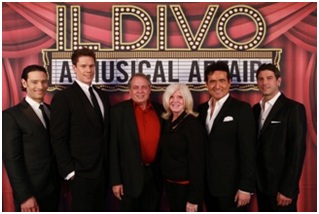 Often when I prepare to shut down my computer for the day, I listen to “The Lord’s Prayer” sung by the pop/opera foursome
Often when I prepare to shut down my computer for the day, I listen to “The Lord’s Prayer” sung by the pop/opera foursome
Il Divo. I recorded it from the second row on an i-Phone when we attended their concert in December 2019.
Sadly, rich baritone singer Carlos Marin (pictured here next to my wife) passed away at age 53 on December 19, due to Covid. The team was doing a tour in England when he became ill and was hospitalized in early December.
Il Divo has been a popular secular singing team since 2004, but some of their songs are on Christian themes (“Amazing Grace” and “O Holy Night” as examples). They have been our favorite singers and my wife and I would hear them in person every year or so and even enjoyed two “meet and greet” contacts. At the second one I said to Carlos in Spanish, “God bless you now and always.” We will miss them as we’ve come to know them.
www.donaldshoemakerministries.com
Contact me at: donaldshoemakerministries@verizon.net
Don has been a member of the clergy in the Long Beach, California area since 1970. He now serves as Pastor Emeritus of Grace Community Church of Seal Beach (where he was senior pastor 1984-2012) and as Senior Chaplain of the Seal Beach Police Department (2001+). He previously was an assistant professor of Biblical Studies at Biola University (1976-84) and chaired the Social Concerns Committee in the Fellowship of Grace Brethren Churches from 1985 to 2019.
His graduate work includes a Master of Divinity from Grace Theological Seminary, a Master of Theology from Fuller Theological Seminary with a concentration in Christian ethics, and a Doctor of Ministry from American Baptist Seminary of the West (now Berkeley School of Theology) with a concentration on the Charismatic Movement. His law school studies included a course on the First Amendment. He and his wife Mary have been married for 55 years. They have two children and six grandchildren.[/vc_column_text][/vc_column][/vc_row]

